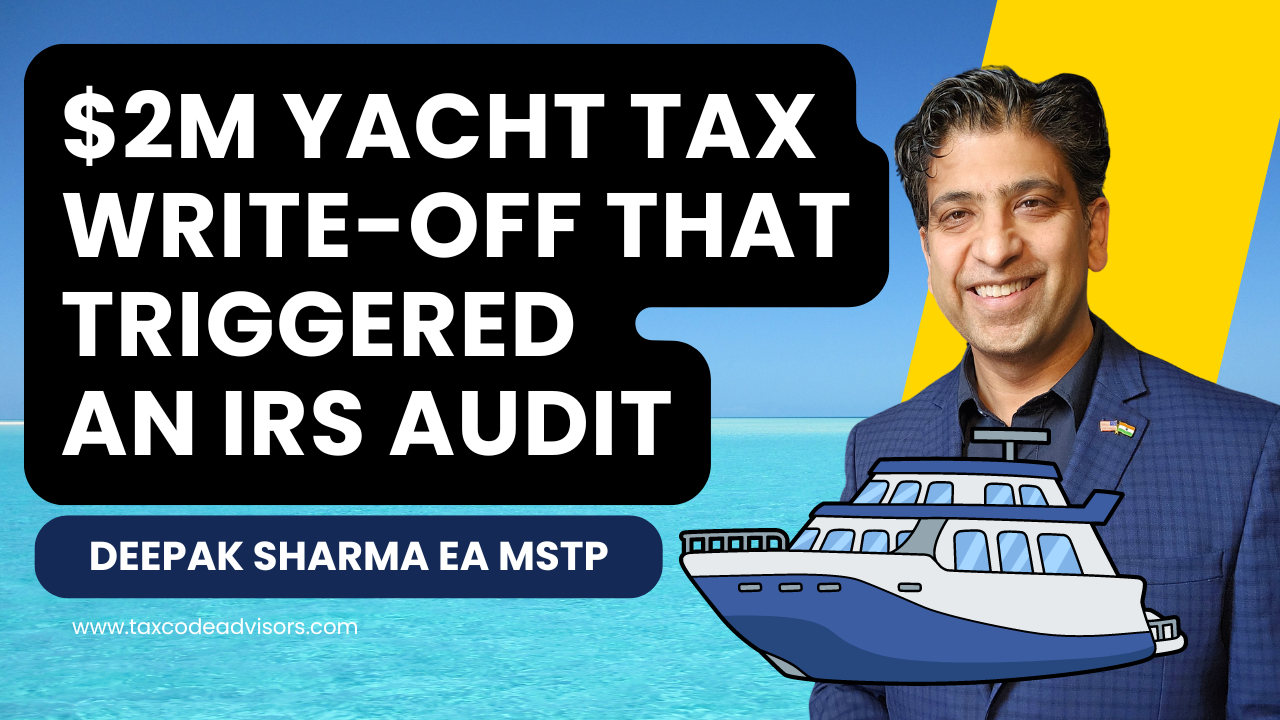
Imagine buying a luxury yacht and thinking it's a savvy business move—until the IRS comes knocking. This is exactly what happened to Damon R. Bansal, an entrepreneur who tried to turn a $2 million yacht purchase into a tax write-off, only to face the harsh reality of an IRS audit. This case provides a compelling lesson in the importance of understanding tax laws, maintaining meticulous records, and ensuring every business expense is justified. Here’s how you can avoid making the same mistake.
Damon R. Bansal, a seasoned entrepreneur in the real estate development sector, decided to purchase a 67-foot fishing yacht for around $2 million in 2005. He bought the yacht through one of his companies, believing he could classify it as a business expense and claim substantial tax deductions.
However, the yacht was primarily used for leisure. Bansal participated in a few fishing tournaments, but he did not engage in any commercial fishing activities, such as chartering the yacht or selling fish. It was mostly docked near his home, with no clear business-related usage. Despite this, Bansal claimed the yacht as a business expense on his company's tax returns, seeking to reduce his tax liability.
The IRS audit that ensued revealed several critical errors in Bansal's approach:
Lack of Substantiation: The IRS found no evidence to support the claim that the yacht was being used for business purposes. There were no logs, receipts, or records that demonstrated the yacht contributed to generating business income or was necessary for business operations.
Inadequate Record Keeping: Beyond the lack of substantiation, the IRS pointed out the sloppy bookkeeping practices of Bansal’s company. Proper record-keeping is not only crucial for internal business management but also for defending business expenses during an audit. In this case, the records were insufficient to justify the yacht as a business deduction.
Incorrect Deduction Claims: At the time of the audit, entertainment expenses were partially deductible (50%), unlike today’s rules under the Tax Cuts and Jobs Act. However, Bansal's claim for the yacht did not align with the law, as the yacht was not used in a manner that could be justified under business entertainment or transportation rules.
As a result, the IRS disallowed the entire deduction, leading to a hefty tax bill that included penalties and interest. This case highlights the importance of understanding the nuances of business expenses and the potential consequences of getting it wrong.
The case of Damon R. Bansal offers several crucial lessons for business owners considering substantial deductions:
Ensure a Valid Business Purpose: For an expense to be deductible, it must be both "ordinary" and "necessary" to the business. "Ordinary" means the expense is common and accepted in the industry, while "necessary" implies it is helpful and appropriate for the business. A yacht might be ordinary in a charter business but not for a real estate developer.
Meticulous Record Keeping is Essential: Accurate and detailed records are the backbone of any successful tax deduction strategy. Logs, receipts, and clear documentation showing who, what, where, when, and why are crucial. Had Bansal maintained detailed logs or substantiated a legitimate business use, the outcome could have been different.
Understand and Comply with Tax Laws: The IRS has specific guidelines on what constitutes a deductible business expense. It’s not enough to simply assume an expense qualifies; business owners must ensure compliance with the law. Incorrectly claiming deductions can lead to audits, penalties, and even more severe financial consequences.
Don't Follow the Crowd: Just because another business owner claims a similar deduction doesn't mean it's right or will hold up under scrutiny. Each business and its circumstances are unique, and what works for one may not be applicable to another.
Prepare for the Worst-Case Scenario: Always be prepared for an audit. Have all necessary documentation and proof readily available to defend your deductions. In Bansal's case, the lack of preparation and documentation led to the disallowance of the deduction and a significant financial loss.
To avoid making the same mistakes as Bansal, business owners should consider the following steps:
The $2M yacht tax write-off serves as a stark reminder of the importance of understanding tax laws and maintaining proper documentation for all business expenses. Business owners should learn from Bansal's mistake: just because an expense seems like it could be a deduction doesn’t mean it is. It’s essential to understand the rules, keep meticulous records, and ensure every deduction claimed is both legitimate and defensible.
By taking these proactive steps, you can protect your business from costly mistakes and ensure your operations remain on solid financial footing. When in doubt, consult with a tax professional to stay compliant and maximize your business's financial health.
Ready to dive deeper and tailor a strategy specifically for your needs? Set up a FREE discovery call with Tax Code Advisors to learn more.
Stocks Investment HSA Health Insurance Buy-Sell Questions Business Gift Kids Financial freedom Retirement planning Financial freedom number Withdrawal rates Investment strategies Long-term financial planning Debt management Tax planning Personal finance Buy Rent Real Estate Rates Tax Strategies HRA Medical llc payroll Tax Tax Strategy Fraud Partnerships Partners Tax Case